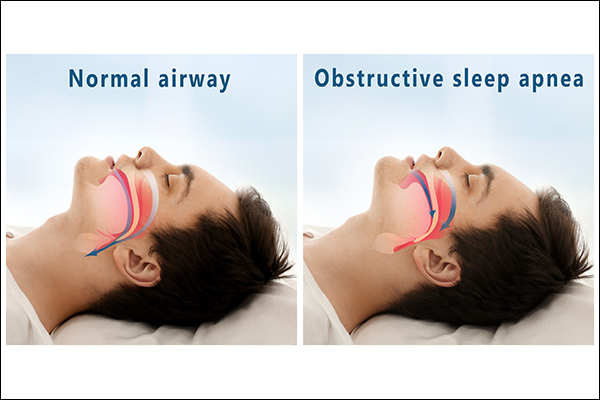In this article:
Sleep is a fundamental physiological process which involves the entire brain and body every night.

It is essential for survival, although, on the surface, it appears to be against the evolutionary principles of survival and procreation. Its entire scope of biological impact is yet to be understood.
Sleep is a reduced state of consciousness where the entire brain and body repair, rejuvenate, revitalize, and restore themselves.
Lack of optimal sleep has been increasingly linked with several other disorders spanning all organ systems, head to toe, such as anxiety, depression, high blood pressure, obesity, and increased risk of heart disease.
What Is a Sleep Disorder?
Sleep disorders are a group of conditions that are characterized by either poor quality and/or poor quantity of sleep and, in some instances, poor quality of wakefulness that interfere with the optimal functioning of the individual.
If left untreated, compromised sleep can lead to serious symptoms and conditions. There are seven groups of sleep disorders and over 70 defined sleep disorder diagnoses, according to the International Classification of Sleep Disorders, Third Edition. (1)
Major Types of Sleep Disorders

According to the International Classification of Sleep Disorders, Third Edition, the seven categories of sleep disorders are as follows: (2)
- Insomnia, especially chronic insomnia
- Sleep-related breathing disorders, such as snoring and obstructive sleep apnea
- Central disorders of hypersomnolence, such as narcolepsy and idiopathic hypersomnia
- Circadian rhythm sleep-wake disorders, which include jet lag and delayed sleep-wake phase disorder
- Parasomnias, such as sleepwalking and rapid eye movement (REM) behavior disorder
- Sleep-related movement disorders, such as restless leg syndrome
- Other sleep disorders
Causes of Sleep Disorders
The contributing factors that lead to the onset of sleep disorders are similar to the ones that cause other medical conditions and can be grouped into the following:
1. Genetic risk factors
This implies that a family history of similar disorders may leave you at a higher risk for the same.
2. Anatomy
Which includes obesity, oral-nasal passages, neck circumference, and jaw shape and size.
3. Extrinsic factors
Extrinsic factors such as poor habits, anxiety, stress, alcohol or tobacco consumption close to bedtime, and excessive LED exposure right before sleeping can lead to the onset of sleep disorders.
4. Medical conditions and medications
Medical conditions and medications can have an adverse impact on sleep and can ultimately lead to sleep disorders.
Common Symptoms of Sleep Disorders
Common symptoms of sleep disorders include:
- Excessive daytime sleepiness
- Restless sleep at night
- Inability to fall and or stay asleep
Snoring, choking, or gasping for air at night is also a common set of symptoms for a dangerous sleep disorder called sleep apnea.
Other symptoms include:
- Sleepwalking
- Sleep talking
- Dream enactment along with leg movements at night
Standard Treatment for Sleep Disorders
Recognizing the sleep disorders is the most important first step, based on which your doctor will recommend the most appropriate treatment. After a thorough evaluation by a sleep specialist, techniques and modalities often employed to treat sleep disorders include but are not limited to:
- Behavioral therapies
- Education and counseling
- Positive airway pressure devices such as CPAP
- Oral appliances
- Medications that can commonly be either sleep-promoting or wake-promoting
- Light therapy
Diagnosis of Sleep Disorders
Sleep disorders are diagnosed with a careful history evaluation and examination. In certain cases, sleep studies (overnight testing, daytime testing or actigraphy) may be utilized. (3)
Exercises or Activities That Can Help Improve Sleep
As sleep is a delicate and synchronized phenomenon by the brain and body, you need to have an appropriately primed body and brain for healthy sleep.
- Physical activity (e.g., aerobic exercise for 30 min), at least 4 hours or more before bedtime, can enhance sleep. (4)
- Daily 10–15 min meditation practices may help in calming the “busy mind,” allowing for restful sleep.
- Playing certain wind instruments may have a positive impact on reducing snoring.
Ways to Improve Your Sleep Routine

You said it – “routine” – that’s the key. Having a defined routine is the most important ingredient for quality sleep. Here are easy tips you can follow:
- Maintain consistent bedtimes on weekdays and weekends as far as possible.
- Keep the bedroom reserved for sleep or intimacy.
- The bedroom should be dark, quiet, and cold (68°F or less)
- Practice Dr. Singh’s 4-play method: shower –> journal –> read –> breathe.
- Take a warm shower for 15 minutes.
- Journal for 15 minutes. Write down your thoughts, worries, and to-do-lists in a journal.
- Read. Yes, a book, not on a screen. Preferably not a mystery or thrilling storyline.
- Breathe. Learn a simple meditative breathing technique, such as the 4 seconds in and 8 seconds out breathing or box breathing.
- Avoid screens, including phones, tablets, laptops, and TV before bed.
- Do not have clocks that are lit up. White noise (e.g., the whirring sound from a table fan) can be helpful for some.
- Have a bedtime alarm that reminds you to go to bed. If awakened in the middle of the night, avoid checking the time, and if unable to return to sleep, try a relaxing breathing routine. Get 7–8 hours of sleep. There is a science to prove that less than 6 hours of sleep chronically can lead to deleterious health effects. (5)
Lastly, let sleep come to you. Do not try too hard to sleep. Sleep is like a flight – you show up on time, follow the routine, and let the pilot (your brain and body in this case) fly the plane for you.
Are Sleep Disorders Curable in the Long Run?
Some sleep disorders, such as insomnia and sleep deprivation, can be cured, while others, such as sleep apnea and narcolepsy, can be effectively managed. The key is to not ignore the symptoms for long and to seek early treatment.
Most Dangerous Sleep Disorders

Several sleep disorders can be detrimental if left untreated, but the most common and often undiagnosed is obstructive sleep apnea.
I call it the “not so silent killer” because it is characterized by recurrent loud snoring, followed by periods of absent breathing due to airway collapse and ending in recovery gasps. This causes oxygen levels to drop repeatedly throughout the night.
This goes on for years before it is diagnosed and treated. During this time, the body and brain lose oxygen several times a night, and several organ systems face slow but sure chronic damage over time.
Aside from relationship discord and sleep-vorce (or sleep divorce, where the spouse who is bothered by loud snoring leaves the room and sleeps elsewhere), the condition causes chronic and at times irreversible damage to various organ systems.
Obstructive sleep apnea, if left untreated, is known to:
- Increase motor vehicle accidents
- Increase blood pressure
- Increase heart attacks
- Increase stroke risk
Obstructive sleep apnea is also shown to increase the risk of atrial fibrillation (a common heart rhythm irregularity), heart failure, sudden death, and depression. (6)
It is estimated that total loss of life expectancy due to untreated severe sleep apnea could be close to 10 yrs.
Complications Associated With Sleep Disorders
The complications of untreated sleep disorders can be varied and several. The common consequences of untreated sleep disorders include:
- Poor productivity, reduced attention spans, and increased reaction times
- Marital/relationship discord
- Increased motor vehicle accidents (7)
- Mood disorders (7)
- Memory deficits
- Metabolic dysfunction – weight gain and impaired glucose tolerance, which can lead to diabetes (7)
- Increased urination at night
- Increased risk of hypertension
- Increased risk of heart attacks, heart arrhythmias, and stroke (7)
- Increased risk of all-cause mortality
Final Word
If you are tired of feeling tired, tired of waking up unrefreshed, or fed up with your spouse complaining about your snoring, do not wait to bring this up with your primary care provider or seek a sleep specialist.
You are designed to sleep for about ⅓ of your entire life. If it is not of the best quality, your other ⅔ of your life will not be of the best quality either. The more you invest in sleep with the currency of discipline and routine, you will reap excellent dividends, in the form of a healthy and productive life.
Alongside nutrition and physical exercise, optimal sleep comprises the third and probably the most important pillar of health. Good sleep = good health = good life!
- Was this article helpful?
- YES, THANKS!NOT REALLY


